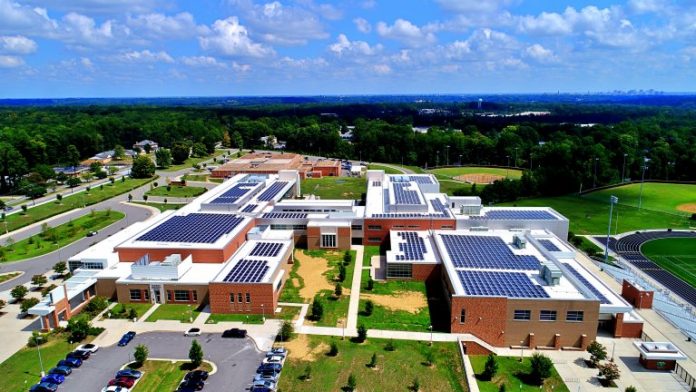With sweeping new clean energy laws set to go into effect July 1, Virginia utility regulators are preparing to reopen a popular program that allowed customers including local governments, school systems and churches to get their energy from non-utility solar developers.
The program, which has been run as a pilot by the State Corporation Commission since 2013, lets customers enter into what’s known as a power purchase agreement with a solar or wind company despite being in utility territory. (Although the pilot can also include wind energy, it has only so far been used for solar.)
Since January, however, customers of Dominion Energy, the state’s largest electric utility, have been blocked from moving forward with their PPA plans after pilot participation hit a 50 megawatt cap. With no subscribers at all, Appalachian Power Company’s seven megawatt cap has yet to be reached.
The ceiling particularly threatened Fairfax County’s plans to install about 44 megawatts of solar on sites owned by the county government, public school system and park and housing authorities.
Under the PPA, a developer installs solar panels on a customer’s property and in return gets the right to sell the energy back to the customer, usually at a lower price than that offered by the utility.
Over the past few years, schools and local governments have increasingly seen the financial instrument as a tool to both meet clean energy goals and reduce expenses. Middlesex County Public Schools, for example, reported energy cost reductions of $50,000 in the district’s first year of participation.
In the wake of Dominion’s cap being hit, the issue became a key piece of the negotiations over the Clean Economy Act passed by the Democrat-controlled General Assembly this past session.
Ultimately, the legislation raised the program cap to 1,000 megawatts in Dominion territory and 40 megawatts in Appalachian Power territory, with the Dominion cap evenly divided between jurisdictional customers (those residential, commercial and industrial customers whose rates are set by the SCC) and non-jurisdictional ones (local, state or federal government bodies that contract directly with the utility for their electricity).
While the new caps will not go into effect until July 1, “high interest” from customers on May 7 spurred the State Corporation Commission to announce it would allow interested parties to “pre-register” to participate in the expanded pilot beginning May 14.
The move, which caps pre-registration at 10 megawatts for Appalachian Power customers and 125 megawatts each for Dominion’s jurisdictional and non-jurisdictional customers, will allow projects to get into the queue for quicker startup once the new law enters into effect.
Kambiz Agazi, director of Fairfax County’s Office of Environmental and Energy Coordination, said that “it’s good to see that the SCC is being proactive, and I’m happy about that, but I don’t know that it will make much of a difference for us.”
While Fairfax advocated for the cap to be raised this winter, Agazi said that officials have been moving forward with PPAs for about 6.5 megawatts of solar to be installed at seven Fairfax schools — a process that he said takes about six to nine months from start to finish.
The new 500 megawatt non-jurisdictional cap, he said, should be “more than enough for Fairfax County.”
“It’s going to last (Virginia) awhile, at least three to five years,” he said.






